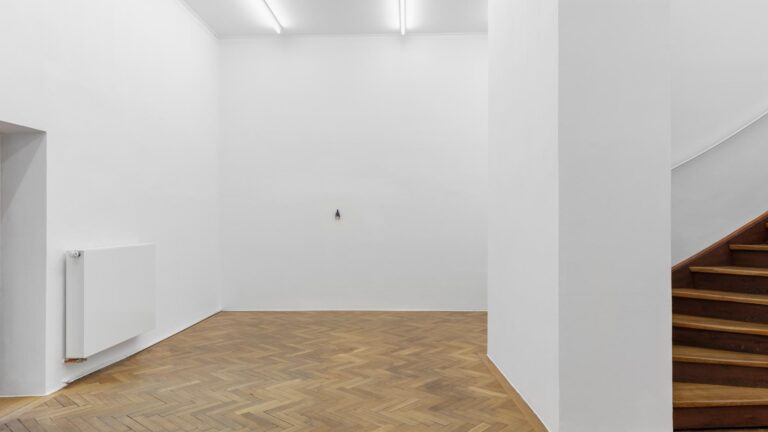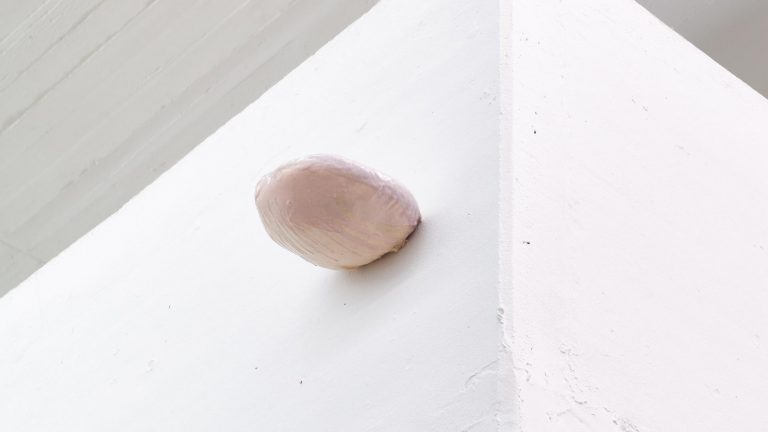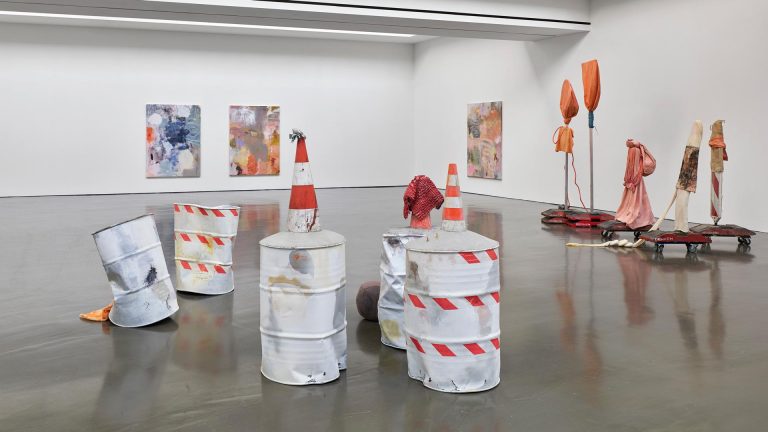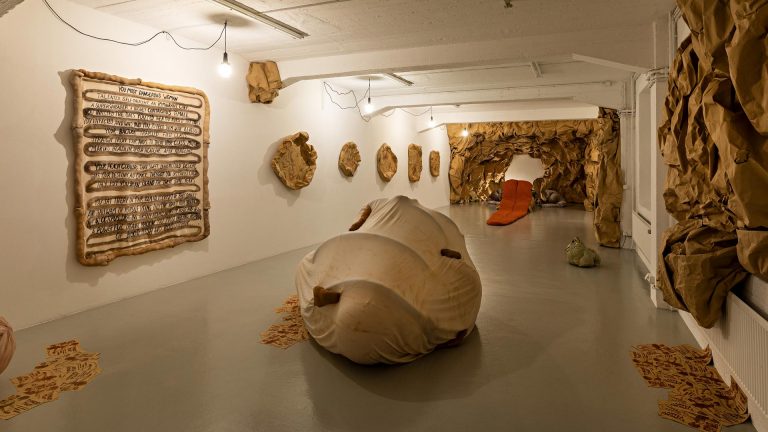Artist: Albert Oehlen
Venue: Jahn und Jahn, Munich, Germany
Date: October 7 – November 18, 2017
Photography: all images copyright and courtesy of the artist and Jahn und Jahn, Cologne
Contemporary, but…
Jahn und Jahn are delighted to announce Albert Oehlen’s first solo exhibition. For over 30 years, through his continual questioning of what painting was, is today and could be tomorrow, he has been one of the most influential international painters. Taking huge risks, he crosses all boundaries of aesthetic convention – ‘good taste’, representational readability, autonomous painterly development – and follows a “deep seated” desire for freedom: “I have always been forbidden from using the word ‘freedom’, but I use it anyway. It’s a vaguely romantic word, old-fashioned, but still a beautiful word.”
For Munich, Oehlen has created seven monumental paper works as well as compiling a sophisticated selection of current collages and drawings. He deliberately keeps pace with the times and his images manage to make “a noise like the contemporary world”, as Rainald Goetz noted.
And so we see fragments from advertisements harshly cut out; fragments of the “Image” of a globalised world of goods. Logos that shout luridly, seduce or touchingly strive to be hip, slogans and trigger words which act as uninhibited start-up fantasies (“Roomster”) or nostalgic re-branding (Miele) all of which want to be contemporary (“Style”), including mobility (“IVECO”), telecommunication (“Orange”) and reliably solid scandals (“VW”). Ideologies distributed on a daily basis that just as quickly disappear, images that ultimately no longer know “comfort” or “dreams”, or are simply just “ultra-blunt”.
Albert Oehlen, however, thinks in opposites, always. How much, in the end, do you want to recognise in that which is superficially “there as representational”? Or “keep away from yourself”? The visual volume of advertising messages is quietly and, and at first glance, inconspicuously removed by layers of painting and layers of drawing, their immaculate smoothness is broken by cracks, notches and blurring. Oehlen is once again dealing with “hand-made painting”. A form of painting that nonetheless explicitly knows its opposite and, as such, playfully neutralises it.
Contemporary, but… Therein lies their ‘contemporaneity’, which today almost sounds like melancholy. Perhaps a little bit of comfort and gentle, complex dreams after all? Hopefully. Thus the works can be “simultaneously abstract and representational” and, in spite of all criticism and cynical harshness, extend beyond the mere present, like the „trees“ which also unfold upon them. If “you follow this minimal rule”, there really are trees: “If you say there is something thicker in the middle which gets thinner on the outside, and strokes that move away from it, it is a tree. And if you look at one of the branches, you can see that it has its own ideas. In this way I have fulfilled the representational but can likewise satisfy the ‘task of the abstract artist’ and allow for the most unusual combination of lines to be found.”
It is not the digitalised world of goods that “helps [him] with painting” but, on the contrary, it might be that Albert Oehlen, painting precisely with these outlandish lines, offers impressive ‘points of assistance’ in the understanding of the images of our present.
-Christian Malycha
Albert Oehlen was born in 1954 in Krefeld, Germany. He graduated in 1981 from Hochschule für Bildende Künste, Hamburg. From 2000 to 2009, he worked as a professor in painting at Kunstakademie, Düsseldorf. He lives in Switzerland. Since 1979 he has had numerous solo exhibitions and his work can be found in many public collections including: Boymans van Beuningen, Rotterdam. Carré d’Art, Nîmes. Centro de Arte Reina Sofia, Madrid. Cleveland Museum of Art, Cleveland. De Appel, Amsterdam. Deichtorhallen, Hamburg. Galleria d’Arte Moderna, Bologna. Guggenheim Bilbao. ICA Institute of Contemporary Art, London. Kestnergesellschaft, Hannover. Kunsthalle Basel. Kunsthalle Zürich. Kunstmuseum Bonn. Kunstsammlung Nordrhein Westfalen, Düsseldorf. Kunstverein Reutlingen. LACMA Los Angeles County Museum of Art, Los Angeles. Musée d’Art Moderne de la Ville, Paris. Museo Nacional de Bellas Artes, Havanna. Museum Brandhorst, München. Museum Folkwang, Essen. Museum Ludwig, Köln. Museum Wiesbaden. Neue Galerie Gladbeck. New Museum, New York. Renaissance Society, Chicago. Städel, Frankfurt am Main. Whitechapel Gallery, London.
Albert Oehlen, 2017, exhibition view, Jahn und Jahn, Cologne
Albert Oehlen, 2017, exhibition view, Jahn und Jahn, Cologne
Albert Oehlen, 2017, exhibition view, Jahn und Jahn, Cologne
Albert Oehlen, 2017, exhibition view, Jahn und Jahn, Cologne
Albert Oehlen, 2017, exhibition view, Jahn und Jahn, Cologne
Albert Oehlen, 2017, exhibition view, Jahn und Jahn, Cologne
Albert Oehlen, 2017, exhibition view, Jahn und Jahn, Cologne
Albert Oehlen, 2017, exhibition view, Jahn und Jahn, Cologne
Albert Oehlen, 2017, exhibition view, Jahn und Jahn, Cologne
Albert Oehlen, 2017, exhibition view, Jahn und Jahn, Cologne
Albert Oehlen, 2017, exhibition view, Jahn und Jahn, Cologne
Albert Oehlen, 2017, exhibition view, Jahn und Jahn, Cologne
Albert Oehlen, 2017, exhibition view, Jahn und Jahn, Cologne
Albert Oehlen, Ohne Titel, 2017, Oil, lacquer on paper, 202,7 x 147,6 cm
Albert Oehlen, Ohne Titel, 2017, Oil, lacquer on paper, 202 x 151,4 cm
Albert Oehlen, Ohne Titel, 2017, Oil, lacquer on paper, 200 x 151 cm
Albert Oehlen, Ohne Titel, 2017, Indian ink, pencil on paper, 24,5 x 18,5 cm
Albert Oehlen, Ohne Titel, 2017, Oil, lacquer on paper, 197,8 x 149,8 cm
Albert Oehlen, Ohne Titel, 2009, Paper, foil, Indian ink, pencil on paper, 27 x 17,8 cm
Albert Oehlen, Ohne Titel, 2013, Paper, foil, Indian ink, pencil on paper, 24 x 17,6 cm
Albert Oehlen, Ohne Titel, 2013, Paper, foil, Indian ink, pencil on paper, 27,5 x 17,5 cm



























